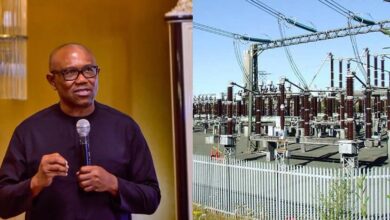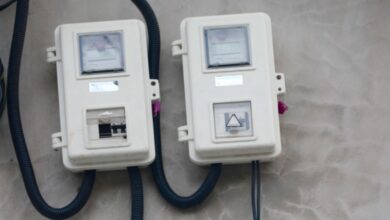The Federal Government of Nigeria has given a directive for the reduction of electricity tariff for customers under the ‘Band A’.
It may be recalled that in April, the Nigerian Electricity Regulatory Commission (NERC), had announced an increase in the tariff, noting that consumer will be charged N225/Kwh, with a daily supply of a minimum of 20 hours power supply.
However, in a notice Ikeja Electricity Distribution Company made available on Monday, per the newly approved review, Band A customers are now to pay N206.80/Kwh.
It said; “Please be informed of the downward tariff review of our Band A feeders from N225/kwh to N206.80/kwh effective May 6, 2024, with guaranteed availability of 20–24 hours of supply daily. The tariffs for Bands B, C, D, and E remain unchanged.”
In related news…
Labour Party presidential candidate, Peter Obi has said it pains him that Nigeria cannot boast of electricity supply to at least one major city in the country, while Tanzania has succeeded in powering all their major cities.
He expressed worry while mentioning a World Bank report which indicated that about 70 per cent of 40 million Tanzanians living in rural areas have received access to electricity.
In a post on his official Twitter (X) handle, the former governor of Anambra state said it is regrettable that Nigeria’s situation remained the opposite, adding that the government must sanitize and rescue the sector.
Obi said in part: “A World Bank report showed how strong political will and commitment have been responsible for rapid electricity access in Tanzania which has seen electricity access move from 7% in 2011 to almost 40% (37.7%) in 2020, during which about 75% (73.2%) of urban dwellers gained access to electricity and about 25% (24.5%) of rural areas gained access to electricity.
“A similar report in June 2023 showed that about 70 per cent of 40 million Tanzanians living in rural areas have received access to electricity, signifying a monumental growth in the sector, while regrettably Nigeria’s situation remains the opposite.
“In Nigeria, 60% of our over 200 million people live without access to electricity, according to a 2022 Energy Progress Report.
“Considering the economic loss resulting from the lack of access to electricity in our nation, which remains immeasurable and with the recent electricity tariff increase, one would expect that we would be able, at least, to power one major city in each geo-political zone soon, and increase our overall access both in the urban and rural areas.
“The government must, therefore, sanitize and rescue the sector for the good of the nation. If Tanzania could achieve such a milestone in power generation, then Nigeria can do it even better, with competent and committed leadership. A stable power sector is very critical for the journey to a New Nigeria, to which we remain committed.”









